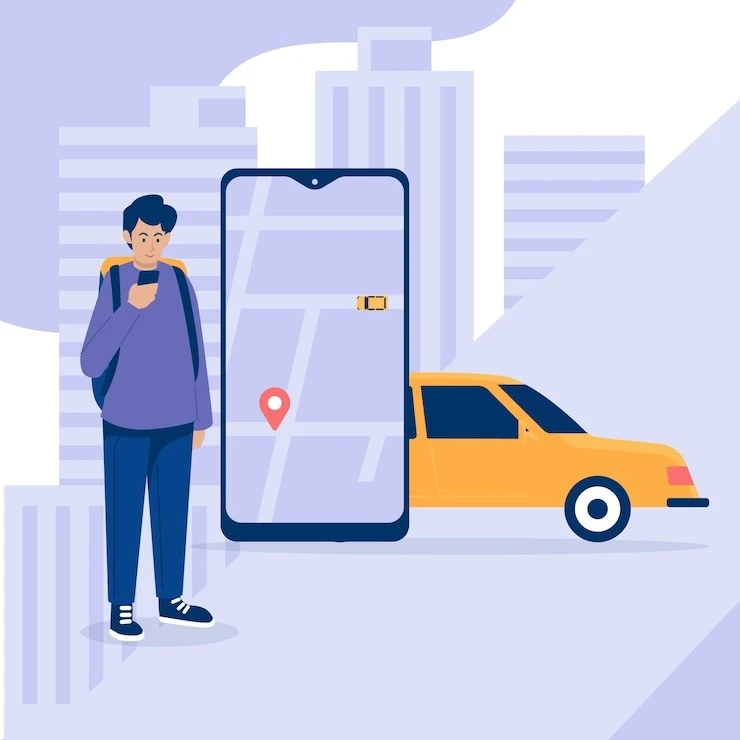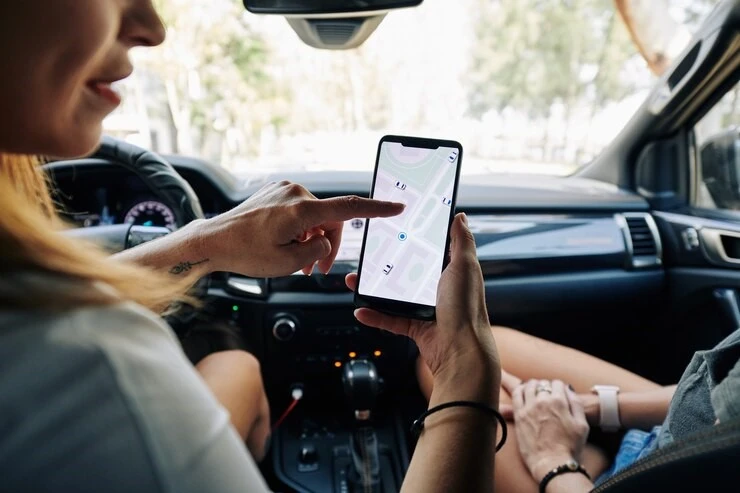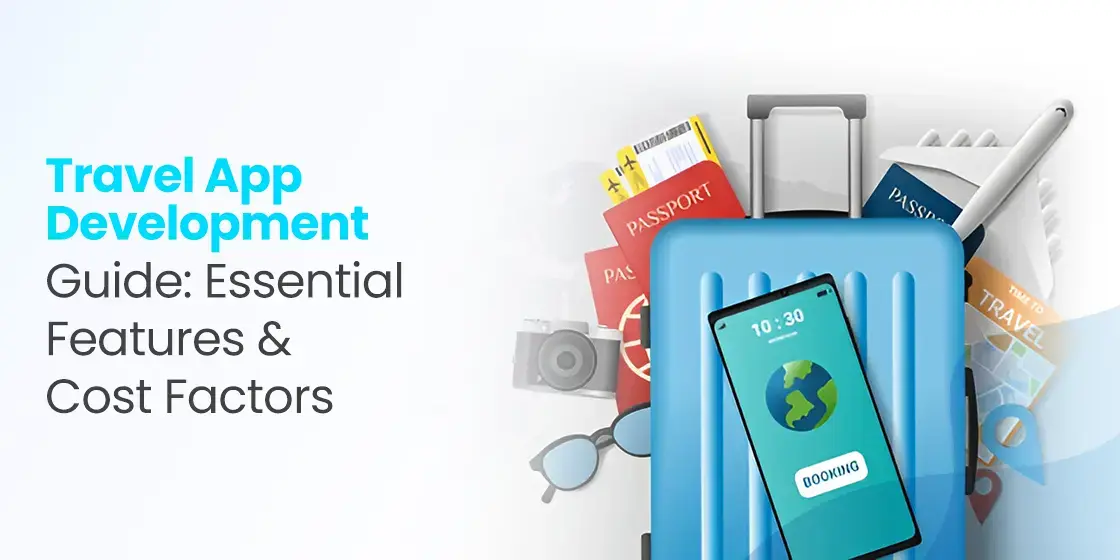Table of Content
Discover How Travel App Development Can Be a Breeze in 2025
The travel industry is experiencing a digital revolution, with mobile apps becoming indispensable tools for modern travelers. As we navigate through 2025, travel app development has emerged as a critical investment for businesses looking to capture their share of the $1.063 trillion travel market. With 67.8% of all travel industry traffic now coming from mobile devices, the opportunity for innovative travel solutions has never been greater.
Whether you’re a startup with a groundbreaking idea or an established travel company seeking digital transformation, understanding the intricacies of traveling app development is essential. From booking flights and accommodations to discovering local experiences and managing itineraries, travel apps have revolutionized how we explore the world.
This comprehensive guide will walk you through everything you need to know about travel application development in 2025 from the minds of skilled mobile app development experts. This would include essential features, development processes, cost considerations, and the latest industry trends that are shaping the future of travel technology.
Let’s begin.
Understanding Travel Apps: A Comprehensive Industry Overview

The travel industry has undergone a remarkable digital transformation, with mobile applications at the forefront of this evolution. In 2025, the global travel and tourism market is valued at approximately $927.30 billion, with projections indicating growth to $1.063 billion by 2028. This exponential growth is largely driven by the increasing adoption of mobile technology and the demand for seamless, personalized travel experiences.
Travel app development has become a cornerstone of modern travel businesses, offering unprecedented convenience and accessibility to users worldwide. Statistics reveal that 41.6% of worldwide travel reservations were completed through mobile apps in 2022, with an additional 10% finalized on mobile websites. This trend highlights the critical importance of having a robust mobile presence in today’s competitive travel landscape.
The shift towards mobile-first travel solutions isn’t just a trend—it’s a fundamental change in consumer behavior. Modern travelers expect instant access to booking services, real-time updates, personalized recommendations, and seamless payment processing, all available at their fingertips. Companies that fail to adapt to this mobile-centric approach risk losing significant market share to more agile competitors.
Key Benefits of Travel Apps for Businesses
Travel app development offers numerous advantages for businesses operating in the tourism sector. First and foremost, mobile apps significantly enhance customer loyalty by providing a direct channel for engagement and personalized communication. Unlike websites, apps remain installed on users’ devices, creating multiple touchpoints for brand interaction and increasing the likelihood of repeat bookings.
Revenue generation opportunities multiply through travel apps, with businesses able to implement various monetization strategies including commission fees, premium subscriptions, in-app purchases, and targeted advertising. The ability to collect and analyze user data also enables businesses to optimize their offerings, predict customer needs, and deliver tailored marketing campaigns that drive higher conversion rates.
Operational efficiency improvements are another significant benefit of travel application development. Automated booking processes, digital payment systems, and integrated customer support features reduce manual workload while improving service quality. Additionally, apps enable businesses to operate 24/7, capturing bookings and serving customers across different time zones without the need for constant human intervention.
Current Industry Trends Shaping Travel App Development
Artificial Intelligence and Machine Learning are revolutionizing travel app development, enabling sophisticated personalization engines that can predict user preferences and suggest relevant content. AI-powered chatbots provide instant customer support, while predictive analytics help businesses optimize pricing strategies and inventory management. These technologies are becoming essential components of competitive travel apps.
Augmented Reality (AR) and Virtual Reality (VR) features are gaining traction, allowing users to take virtual tours of destinations, hotel rooms, and attractions before making booking decisions. This immersive technology reduces booking uncertainty and enhances the overall user experience, particularly for luxury travel and adventure tourism segments.
Sustainability features are increasingly important in travel application development, with eco-conscious travelers seeking apps that promote responsible tourism. Features like carbon footprint tracking, sustainable accommodation options, and local experience recommendations are becoming standard expectations rather than nice-to-have additions.
Step-by-Step Travel App Development Process

Now that we know the scenario of the travel app development industry, let’s take a look at a step-by-step process to create amazing travel apps easily. Let’s begin.
Phase 1: Research and Market Analysis
The foundation of successful travel app development begins with comprehensive market research and competitive analysis. This crucial phase involves identifying target audiences, understanding their pain points, and analyzing existing solutions in the market. Developers must examine popular travel apps like Expedia, Booking.com, and Airbnb to understand industry standards and identify opportunities for innovation.
Market research should include user surveys, focus groups, and behavioral analysis to understand what features travelers value most. This data-driven approach ensures that the final product addresses real user needs rather than assumptions. Additionally, analyzing competitor pricing models, user reviews, and feature sets provides valuable insights for positioning your app effectively in the market.
Regional considerations are particularly important in travel application development, as travel preferences, payment methods, and regulatory requirements vary significantly across different markets. Understanding local customs, currencies, and legal frameworks is essential for creating apps that resonate with diverse user bases and comply with international regulations.
Phase 2: Feature Definition and MVP Planning
Once market research is complete, the next step in travel app development involves defining core features and creating a Minimum Viable Product (MVP) strategy. The MVP approach allows businesses to launch with essential features first, then iterate based on user feedback and market response. This strategy reduces initial development costs while enabling faster time-to-market.
Core features typically include user registration and profiles, search and filtering capabilities, booking systems, secure payment processing, and basic customer support. Advanced features like AI-powered recommendations, social integration, and loyalty programs can be added in subsequent releases based on user adoption and feedback.
Prioritizing features based on user value and development complexity helps optimize resource allocation during travel application development. Features that provide high user value with relatively simple implementation should be prioritized for the MVP, while complex features with uncertain value propositions can be deferred to later development phases.
Phase 3: Design and User Experience
The design phase of travel app development focuses on creating intuitive, visually appealing interfaces that enhance user experience across all touchpoints. This involves developing wireframes, creating interactive prototypes, and establishing design systems that ensure consistency throughout the application. Travel apps must be particularly user-friendly since travelers often use them in stressful situations or unfamiliar environments.
Mobile-first design principles are essential in travel application development, ensuring optimal performance across various device sizes and operating systems. Responsive design elements, clear navigation structures, and accessible interface components contribute to positive user experiences that encourage repeat usage and positive reviews.
Phase 4: Development and Integration
The development phase of travel app development involves writing code, implementing features, and integrating third-party services essential for travel functionality. This includes connecting to Global Distribution Systems (GDS) for flight inventory, integrating with hotel booking APIs, implementing payment gateways, and incorporating mapping services for location-based features.
Technology stack selection significantly impacts travel application development outcomes, with considerations including platform compatibility, scalability requirements, and integration capabilities. Native development offers optimal performance but requires separate versions, while cross-platform mobile app development with React Native or Flutter offer code efficiency at reduced performance.
Agile development methodologies work particularly well for travel apps, allowing teams to iterate quickly based on testing results and stakeholder feedback. Regular sprint reviews and continuous integration practices help maintain code quality while enabling rapid feature deployment and bug resolution.
Phase 5: Testing and Quality Assurance
Comprehensive testing is crucial in travel app development due to the complex integrations and real-time data requirements typical of travel applications. Testing phases include functionality testing, performance testing, security testing, and user acceptance testing across multiple devices and operating system versions.
Load testing is particularly important for travel application development, as the top travel apps often experience significant traffic spikes during peak booking periods, holidays, and promotional events. Ensuring the app can handle high concurrent user loads without performance degradation is essential for maintaining user satisfaction and preventing lost bookings.
Security testing focuses on protecting sensitive user data, payment information, and personal travel details. This includes penetration testing, encryption validation, and compliance verification with relevant data protection regulations like GDPR and regional privacy laws that affect international travel applications.
Popular Types of Travel Apps in the Industry

There are a few categories of popular travel apps that are all the rage in the app development sector. Let’s take a look at some of the more popular travel app categories among these options.
Booking and Reservation Apps
Booking and reservation applications represent the most common category in travel app development, encompassing flight booking, hotel reservations, car rentals, and comprehensive travel packages. These apps require complex backend integrations with multiple inventory providers, real-time availability checking, and secure payment processing capabilities. Examples include Expedia, Kayak, and Booking.com, which have set industry standards for functionality and user experience.
The development cost for booking apps such as ride sharing app development in travel apps category typically ranges from $30,000 to $100,000, depending on the complexity of integrations and supported inventory types. Key features include advanced search filters, price comparison tools, booking management dashboards, and customer support integration. Revenue models often rely on commission fees from service providers and premium feature subscriptions.
Travel Planning and Itinerary Apps
Travel planning applications focus on helping users organize their trips, create detailed itineraries, and manage travel documents. Popular examples include TripIt, Google Trips, and Sygic Travel, which offer features like automatic itinerary creation from email confirmations, offline access to travel plans, and collaborative trip planning for groups.
Travel app development costs for planning applications typically range from $10,000 to $80,000, with variations based on AI integration, social features, and offline functionality complexity. These apps often monetize through premium subscriptions, partnership commissions, and sponsored content from tourism boards or travel service providers.
Navigation and Transportation Apps
Navigation applications serve the critical need for wayfinding and transportation in unfamiliar destinations. Beyond basic mapping functionality, modern navigation apps include public transit integration, ride-sharing connections, real-time traffic updates, and offline capabilities for areas with limited internet connectivity.
Travel app development such as location-based app development requires integration with mapping services like Google Maps or Mapbox, real-time traffic data feeds, and local transportation APIs. Development costs typically range from $15,000 to $60,000, depending on the complexity of features and geographic coverage requirements.
Local Experience and Discovery Apps
Local experience applications help travelers discover authentic activities, hidden gems, and cultural experiences beyond typical tourist attractions. Apps like Airbnb Experiences, Culture Trip, and Viator connect travelers with local hosts and unique activities that provide deeper cultural immersion.
These applications require sophisticated recommendation engines, user-generated content management, and community features that enable travelers to share experiences and reviews. Travel app development costs for discovery apps range from $20,000 to $90,000, with higher costs associated with AI-powered recommendation systems and social networking features.
Frequently Asked Questions
| How much does travel app development cost in 2025? Travel app development costs in 2025 typically range from $20,000 to $150,000 or more, depending on complexity and features. A basic travel app with essential features like booking and payment processing costs between $30,000-$50,000. Mid-complexity apps with advanced features like AI recommendations and real-time tracking range from $50,000-$100,000. Complex applications with multiple integrations, sophisticated UI/UX, and enterprise-grade features can exceed $150,000. Factors affecting cost include platform choice (iOS, Android, or both), number of third-party integrations, UI/UX complexity, and development team location. |
| What are the essential features for a successful travel app? Essential features for travel app development include: user registration and profiles, advanced search and filtering capabilities, secure booking systems, integrated payment gateways, real-time notifications, customer support integration. Additional valuable features include offline functionality, multi-language support, currency conversion, GPS integration, user reviews and ratings, itinerary management, AI-powered recommendations, augmented reality for destination previews, and social sharing capabilities. |
| How long does it take to develop a travel app? Travel app development timelines vary based on complexity and feature requirements. A simple MVP with basic features typically takes 3-6 months to develop. Medium complexity apps with advanced features and integrations require 6-9 months. Complex travel platforms with multiple integrations, AI features, and sophisticated user interfaces can take 9-18 months or longer. Using agile development approaches can help optimize timelines while maintaining quality standards. |
| Which platform should I choose for travel app development – iOS, Android, or both? Platform choice for travel app development depends on target audience, budget, and business goals. Developing for both iOS and Android provides maximum market reach but increases costs and development time. iOS users typically spend more on apps and travel services, making it attractive for premium offerings. Android has larger global market share, particularly in emerging markets. Cross-platform frameworks like React Native or Flutter can reduce development costs while supporting both platforms. Consider starting with one platform for MVP testing, then expanding based on user feedback and market response. |
| What are the main revenue models for travel apps? Travel app development projects can implement various revenue models including commission-based earnings from bookings (typically 3-15% per transaction), subscription models for premium features, in-app purchases for additional services, advertising revenue from travel partners, and freemium models with basic free features and paid premium tiers. Many successful travel apps combine multiple revenue streams to maximize profitability. |
Conclusion
Travel app development in 2025 represents an exciting opportunity for businesses to capitalize on the growing mobile travel market and provide valuable solutions to modern travelers. Success requires careful planning, user-centric design, and strategic feature implementation that addresses real traveler needs while maintaining competitive differentiation.
The key to successful travel application development lies in understanding your target audience, selecting appropriate technology solutions, and implementing features that provide genuine value to users. Whether you’re developing a comprehensive booking platform or a specialized travel tool, focusing on user experience, security, and reliability will determine long-term success in this competitive market.

Empower your digital journey with StruqtIO - Your dedicated partner for cutting-edge custom software development, innovation, and digital transformative solutions. Harness the power of technology to elevate your business and redefine your digital landscape today.


